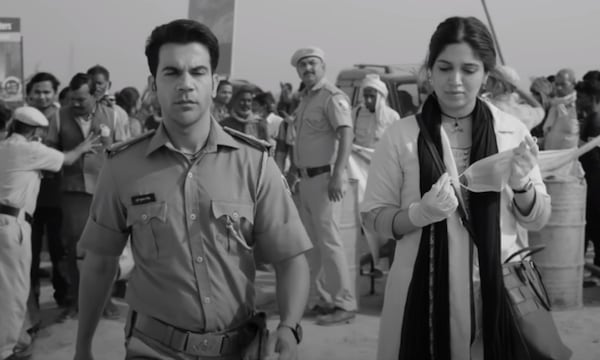Candid Review | Bheed: This Rajkummar Rao starrer examines high cost of bigotry, hate
In Bheed, director Anubhav Sinha examines a deeply divided society against the backdrop of the pandemic.

A still picture from Bheed.
Last Updated: 03.18 PM, May 29, 2023
Bheed is a poignant and significant film that sheds light on the plight of the most vulnerable during the pandemic: the poor. It delves into the unprecedented mass migration that occurred in the country due to the nationwide lockdown, showcasing the struggles faced by migrant workers who were left stranded without livelihoods or means of transportation.
Right from the opening scene, where a tragic incident involving a group of migrants being run over by a train is depicted, it becomes apparent that Bheed is not merely a narrative-driven film. Its primary objective is to serve as a reminder of the tragedies that unfolded alongside the devastation caused by the Covid virus. The film vividly recreates some of the most poignant images from the mass migration, capturing moments such as a girl cycling on the highway with her elderly father and a child sleeping on a suitcase as their parents wheel them along endless miles of road. These visuals effectively emphasise how the pandemic permeated every aspect of people's lives, bringing unimaginable suffering.
For narrative purposes, Bheed centres its story around a state border. Inspector Surya Kumar Singh Tikas, played by Rajkumar Rao, is tasked with controlling the migrating crowd at the state borders. Surya grapples with an overwhelming sense of responsibility. While his primary duty is crowd control, he is also burdened with the task of managing and suppressing the deep-rooted hate stemming from class, caste, and religious differences. Despite his position as a high-ranking police officer, Surya's caste identity becomes an obstacle to receiving the respect and value he rightfully deserves. This blatant practice of prejudice aspect of his job description takes a toll on his mental well-being.
In a scene, Balram Trivedi (Pankaj Kapur), a destitute old man brought to his knees by the lockdown, tells Surya, "If not for your uniform, I would have whipped you. That's why you people deserve." This line encapsulates the frustration and resentment that Balram feels towards Surya, highlighting the power dynamics at play. The scene is so impactful that it portrays an older Balram overpowering a younger Surya, leaving the latter feeling powerless despite his uniform, official position, and a battalion of cops at his disposal.
The portrayal of Surya's struggle goes beyond his physical abilities or the resources at his command. It underscores the internal conflict he faces, torn between his duty to maintain order and his personal battle against discrimination and prejudice.
By emphasising Surya's predicament, Bheed effectively sheds light on the persistent societal issues that hinder progress and fairness. It serves as a reminder that even those in positions of authority and power can be limited and restrained by systemic biases. Through Surya's character, the film invites viewers to reflect on the profound impact that prejudice can have on individuals' well-being, as well as the larger implications for society as a whole.
Balram Trivedi clings to a sense of superiority over Surya due to his caste identity. However, even in his most trying moments, Balram fails to recognise that his unwavering devotion to the rigid caste hierarchy might be the very reason that has kept him trapped in a state of poverty and malnourishment all along. The film suggests that his belief system, which values others solely based on their caste identities rather than their merits or actions, has prevented him from achieving success in life. Bheed highlights the detrimental effects of hate and the limitations it places on individuals, emphasising that not everyone can benefit from such a divisive mindset.
The pandemic served as a profound equalizer, affecting individuals from all walks of life without discrimination. The virus did not discriminate based on social status or religious beliefs; it brought pain and hardship to people irrespective of their backgrounds. Despite the shared experience of facing a deadly virus, society remained divided by deep-seated prejudices and biases. This observation highlights a significant paradox of the pandemic. While people were united in their collective struggle against a common enemy, the existing divisions within society persisted, preventing true solidarity and empathy from taking hold.
Director Anubhav Sinha further heightens the allegory by placing all the action just outside a fancy mall that's stacked with all the supplies that could alleviate the sufferings of the migrants. This juxtaposition of extreme wealth and privilege against the backdrop of desperate migrants highlights the stark disparities that exist within society.
"What wrong did I do?" a baffled Balram Trivedi questions, pursued by cops under a shoot-at-sight order. In response, Suriya retaliates with a cutting remark, "You asked for food, shelter, and water." The weight of this exchange is left to the interpretation of the audience.
In Bheed, Anubhav Sinha examines a deeply divided society against the backdrop of the pandemic. The film serves as a commentary on how some individuals refuse to transcend their prejudices, even during times of immense suffering.
However, at its core, Bheed questions those in power, holding them accountable for disregarding crucial factors and failing to implement measures that would have facilitated a smoother transition into the lockdown, instead plunging the poor people into chaos.
Bheed is streaming on Netflix.

